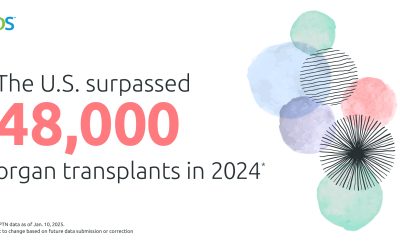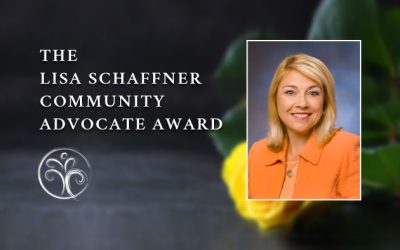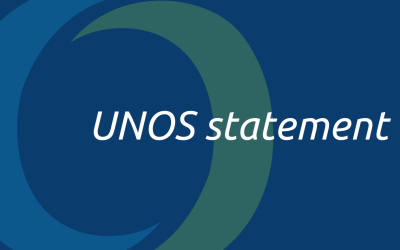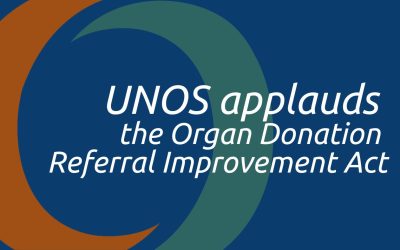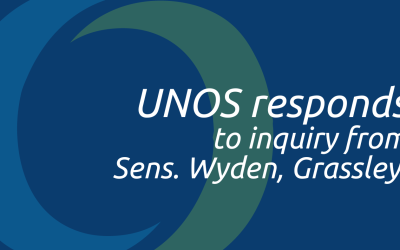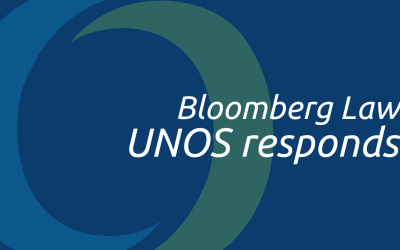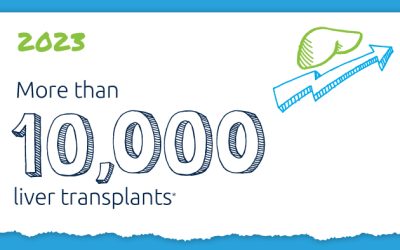By organ
By program
UNet
Policy
Patient safety
Improvement
Learn
Perspectives
COVID
All
Top stories
UNOS adds two members to its board of directors
Melina Davis and Mark Johnson join UNOS’ current seven-member board
U.S. surpassed 48,000 organ transplants in 2024
UNOS advocates for reforms to strengthen the system
Leslie and Bill Carruth awarded annual Lisa Schaffner Community Advocate Award
Donor parents recognized for promoting organ, eye and tissue donation
UNOS adds two members to its board of directors
Melina Davis and Mark Johnson join UNOS’ current seven-member board
U.S. surpassed 48,000 organ transplants in 2024
UNOS advocates for reforms to strengthen the system
Leslie and Bill Carruth awarded annual Lisa Schaffner Community Advocate Award
Donor parents recognized for promoting organ, eye and tissue donation
UNOS CEO Urges Congressional Action on Lifesaving Reforms
Proposes critical ways to strengthen the nation’s transplant system
UNOS and Donate Life America invite you to honor donors
Join National Tree of Life live stream December 16
UNOS continuously strengthens the security of the OPTN IT system
Cybersecurity protections for OPTN IT system
UNOS remains committed to strengthening the system
The United Network for Organ Sharing (UNOS) reinforces its unwavering commitment to serving the nation’s organ donation and transplant community and patients through its contract with the federal government.
UNOS applauds introduction of the Organ Donation Referral Improvement Act
UNOS thanks U.S. Reps. for important bipartisan legislation
UNOS applauds House action to prohibit discrimination in organ transplants
UNOS CEO thanks House, urges Senate action
UNOS responds to House subcommittee hearing
UNOS responds to House subcommittee hearing held Sept. 11, 2024.
Andrew Klein, M.D. named UNOS Chief Medical Officer
UNOS welcomes new CMO
UNOS responds to inquiry by Sens. Wyden, Grassley about new Chief Technology Officer
Sens. Wyden and Grassley expressed concern about the hiring of UNOS CTO Ankit Mathur. UNOS sets the record straight with an official response.
UPDATE: UNOS responds to inaccuracies in Bloomberg Law article
Bloomberg Law published an article about allegations of conflicts of interest involving UNOS Chief Technology Officer Ankit Mathur. UNOS challenges these defamatory claims and sets the record straight.
UNOS applauds U.S. Senate Appropriations Committee for increasing funding for the OPTN Modernization Initiative
UNOS statement applauds Senate Appropriations Committee for OPTN Modernization funding increase
UNOS welcomes new chief legal officer
Elizabeth “Emy” Trende joins as general counsel overseeing legal strategy
Kidney – Pancreas
Now available: Predictive analytics in desktop DonorNet
These predictions are intended to supplement, not replace, existing data and clinical judgment.
Deceased kidney donors recovered increase six-months post-implementation minimum donor criteria for kidney biopsies
Early data shows a six percent increase of deceased kidney donors recovered in the post-policy era compared to the pre-policy era.
Black kidney candidates are receiving waiting time modifications, helping them get the organs they need
Latest kidney monitoring report shows two new kidney polices are working as intended
Liver – Intestine
Liver treatment options added for HCC exception candidates
Additional diagnosis code changes to be implemented in a later phase.
Offer Filters for liver and heart now available
Offer Filters adds data-driven, multi-criteria filters to organ offers at a program level.
Coming soon: Offer Filters for liver and heart allocation
The Offer Filters tool will become available for heart and liver transplant programs in UNet on June 13.
Heart – Lung
Lung CAS summary data updated
Information for lung transplant programs on the distribution of scores for all active registrations waiting for lung transplants in the U.S.
Implementation notice: Standardize six-minute walk for lung allocation
New policy requirement in effect that requires lung transplant programs to perform an oxygen titration test ahead of initial the six-minute walk test.
Pre-implementation notice: Standardize six-minute walk for lung allocation
A new policy requirement is going in effect that will require lung transplant programs to perform an oxygen titration test ahead of the initial six-minute walk test.
VCA
VCA Uterus no longer needs body part selection- effective March 27, 2024
The OPTN’s data collection for vascularized composite allografts (VCAs) in UNet SM
will no longer require body part selection for uterus registered candidates according to VCA committee guidance which specified the body parts (uterus, vagina, cervix).
Extra Vessels included in TIEDI® for VCA
TIEDI® permissions for Vessels Reporting have been added to all 10 VCA organs within Security Administration. These permissions allow designated users either full access or read only access, similar to existing permissions for non-VCA organs. Ensure permissions established before March 6, 2024.
Two guidance documents updated
Resources address VCA donation, geographically endemic infections
Improving the system together
2023: a year of more lives saved
Celebrating memories made and milestones reached, thanks to the gift of life.
Predicting the future to help patients today
New tool offers never-before-seen insights on the impact that accepting or declining an organ offer could have on a patient.
OPO partners with Black history museum to increase organ donor registrations
Kia Potts tells us how LifeNet Health and a Richmond-area cultural institution worked together to change lingering misconceptions about organ donation.
UNet
Liver treatment options added for HCC exception candidates
Additional diagnosis code changes to be implemented in a later phase.
Offer Filters for liver and heart now available
Offer Filters adds data-driven, multi-criteria filters to organ offers at a program level.
New enhancements added to DonorNet
The enhancements give users quicker access to member contact information and more visibility of the most recent donor record update.
Policy changes
Implementation notice: Standardize six-minute walk for lung allocation
New policy requirement in effect that requires lung transplant programs to perform an oxygen titration test ahead of initial the six-minute walk test.
Pre-implementation notice: Standardize six-minute walk for lung allocation
A new policy requirement is going in effect that will require lung transplant programs to perform an oxygen titration test ahead of the initial six-minute walk test.
Transplant programs, OPOs must specify second Patient Safety Contact as of July 25
The secondary contact will be notified if the primary cannot be reached.
Policy monitoring
Deceased kidney donors recovered increase six-months post-implementation minimum donor criteria for kidney biopsies
Early data shows a six percent increase of deceased kidney donors recovered in the post-policy era compared to the pre-policy era.
Black kidney candidates are receiving waiting time modifications, helping them get the organs they need
Latest kidney monitoring report shows two new kidney polices are working as intended
Lung transplant rates continue to increase six months post implementation of new lung policy
Lung-alone transplants have increased by 11.2 percent.
Learn: Collaborative improvement and educational resources
IN FOCUS
A decade of record increases in liver transplant
10,660 liver transplants, the most ever in a year.
Collaboration
Public Comment open from July 27 through Sept. 19, 2023
The OPTN is offering 14 items for review.
Public comment now open through March 15
The winter 2023 public comment cycle opened Jan. 19 and closes March 15.
National collaborative focusing on organ offer acceptance to launch at the end of January 2023
More than 80 transplant programs are participating in the project; a virtual option for the in-person kickoff event is available to the entire community.
Education
TMF 2025 speaker Ankit Mathur on AI in Transplant and OPO Operations
By gaining a better understanding of data analytics, predictive data models and AI technologies in organ transplantation, we can foster more thoughtful and informed conversations about the possibilities they offer moving forward.
TMF 2025 speaker Laura Butler on Collaborative Leadership in Transplantation
Collaboration between clinical, business and regulatory roles is essential to building transplant programs that prioritize patient care and outcomes. Having lived on both sides of transplant care, I’m passionate about sharing the lessons I’ve learned.
![]()
Effective practices
Learn about collaborative improvement projects
Learn about issues impacting patients, donors, donor families, and the national system. Issues and advocacy
Patient safety
Transplant programs, OPOs must specify second Patient Safety Contact as of July 25
The secondary contact will be notified if the primary cannot be reached.
Two guidance documents updated
Resources address VCA donation, geographically endemic infections
OPTN Board approves improvements to reporting of potential patient safety events
Process for reporting enhanced, clarified.
Transplant hospital
Implementation notice: Standardize six-minute walk for lung allocation
New policy requirement in effect that requires lung transplant programs to perform an oxygen titration test ahead of initial the six-minute walk test.
Pre-implementation notice: Standardize six-minute walk for lung allocation
A new policy requirement is going in effect that will require lung transplant programs to perform an oxygen titration test ahead of the initial six-minute walk test.
Coming soon: Offer Filters for liver and heart allocation
The Offer Filters tool will become available for heart and liver transplant programs in UNet on June 13.
OPO
Coming soon: Offer Filters for liver and heart allocation
The Offer Filters tool will become available for heart and liver transplant programs in UNet on June 13.
Mandatory training and UNet user audit opens Feb. 28, 2024
Beginning Feb. 28, 2024, site security administrators will have four weeks to complete the required audit of their UNet users. Prior to completing the audit, site security administrators must complete the updated training course UNet Security Administration (SYS 150)...
Latest in reporting positive post procurement donor results
A new permission in Security Administration was added today for transplant programs. Starting Feb. 28, Transplant Programs will be able to view and acknowledge receipt of these notifications from a new dashboard in DonorNet. The dashboard will be visible only to hospital users who have this new permission to acknowledge these notifications.
Histocompatibility
CPRA >98% form for highly sensitized candidates removed
All candidates with a CPRA above 98% continue to be prioritized on the match appropriately.
Coming soon: CPRA >98% form removal for highly sensitized candidates
Transplant hospitals will no longer be required to obtain signatures and update candidate registrations when a candidate’s CPRA is above 98%. There are no changes needed for OPOs.
Member actions required: data collection and VCA implementation
Patient care will not be impacted during this time.


